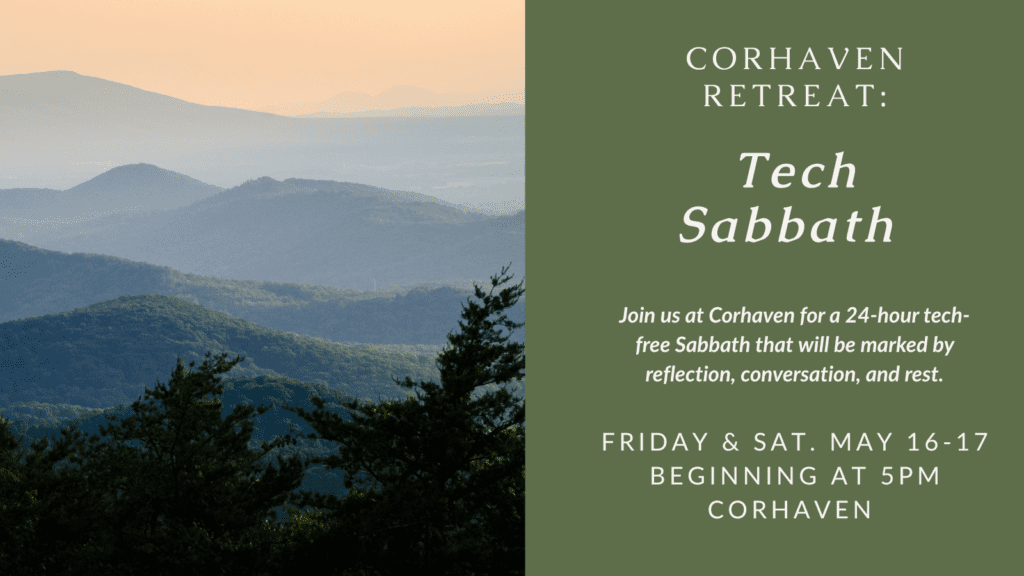For Practicing Spiritual Formation and Cultural Resistance
“We also promise that if the people of the land should bring any merchandise or grain to be sold on the Sabbath or on any other holy day, we will refuse to buy it.” – Nehemiah 10:31
“We are not the customers of social media, we are the product. Social media is selling us to advertisers.” – Douglas Rushkoff
For the Israelites, one of the primary distinctions between being slaves of Pharaoh vs children of YHVH was the practice of sabbath rest. This practice of sabbath rest was both a gift for previously enslaved bodies and a command for hearts and minds still colonized by the ways of the empire.
Let’s assume for the sake of argument that most Christian’s today actually believe that the practice of sabbath, while no longer a binding law, remains an essential gift of grace (see Mark 2). One that ought to be observed as a part of our spiritual formation. What does the sabbath look like in the digital age? Walter Bruggerman, in his book Sabbath as Resistance writes:
“The danger of globalized technology is to reduce everything and everyone to a commodity that can be used, administered, and given a price tag. Sabbath is an insistence that we and all others are neighbors, not commodities.”
Amidst the digital revolution there has taken place one of the great sleight of hand maneuvers in advertising history and one that, I am arguing, ought to impact how Christians practice sabbath rest.
For example, say that I, as a young man in the nineties, was perusing downtown on a Sunday afternoon and came upon a poster advertising a local concert. It would be hard to make the case that I “broke the Sabbath” by engaging in commerce (see Nehemiah 10). After all, I did not pay to see the poster, I simply came upon it.
Now, twenty-five years later, say this upcoming Sunday, I am once again perusing, only this time on Instagram, and up pops an advertisement for a local concert. What is the difference? After all, I paid no more to see the advertisement on Instagram than I had paid to see the advertisement on the street.
The difference is that on the street downtown I was simply a potential customer whose attention was being appealed to, and my consent to participate was still up to my discretion. On Instagram, I gave my consent the moment I signed up for their services in exchange for my data, and that data now functions as the active product being sold to third-party advertisers. This is nothing short of the commodification of human attention.
“At the end of the day, a business model that preys on human attention means we are worth more as human beings and as citizens of this country when we are addicted, outraged, polarized, narcissistic and dis-informed because that means the business model was successful.” – Tristan Harris before the Senate Judiciary Committee
Attention is worship. The first four commandments given at Mount Sinai, rooted in worship, are all designed to direct honoring attention towards our Creator. Our attention, having been rooted in the goodness of our creator, is then directed towards our bearing good fruit in the created world around us. In this way, the fourth command, to keep the sabbath, is the hinge point between our spiritual formation and our “Kingdom” action.
Many of us, over the last five years, thanks to people like Jonathan Haight and Jean Twnege, have come to recognize the importance of moderating our consumption of social media for the sake of our own personal mental health. The church, however, has been slow to recognize that beyond personal mental health, digital disengagement as a part of the sabbath is critical to the spiritual formation of the church as a collective body. For this I deeply appreciate the wisdom of Andy Crouch:
“Empires do not offer a sabbath; sabbath must be taken in the face of the empire. As such the sabbath functions as a circuit breaker on idolatry. The beautiful thing about the sabbath is that you discover your dependencies and are freed from them in the same act. It also resets the other six days in a way that nothing else can. Sabbath, therefore, is the lynch pin practice of resistance, but it can only be practiced in community.” – Andy Crouch, speaking on Veritas Forum
 So what, practically speaking, does it look like to receive the gift of a digital sabbath? Well that is the fun part that we have an opportunity to discover together:
So what, practically speaking, does it look like to receive the gift of a digital sabbath? Well that is the fun part that we have an opportunity to discover together:
Join us May 16th-17th for a 24 hr collective digital sabbath. Our time together will be marked by reflective prayer practices, food and fellowship, intentional conversation on developing a healthy digital diet, as well as opportunities for silence, solitude, and play. Email Ken to RSVP.
